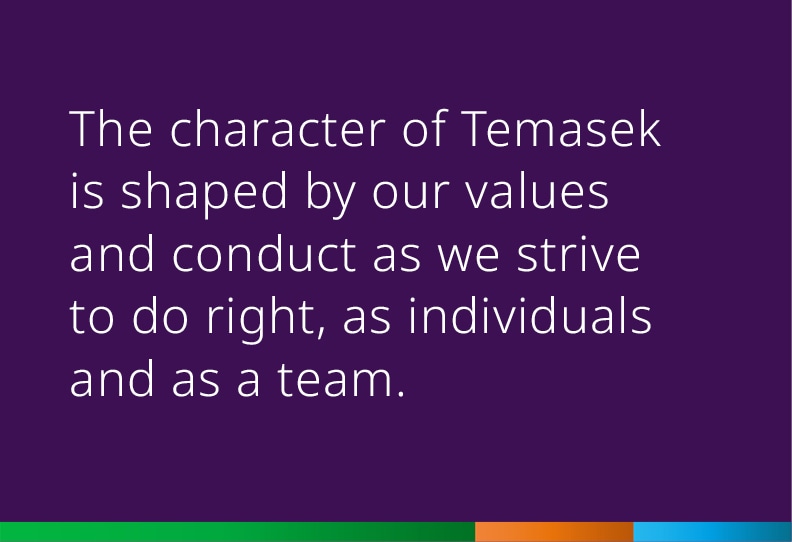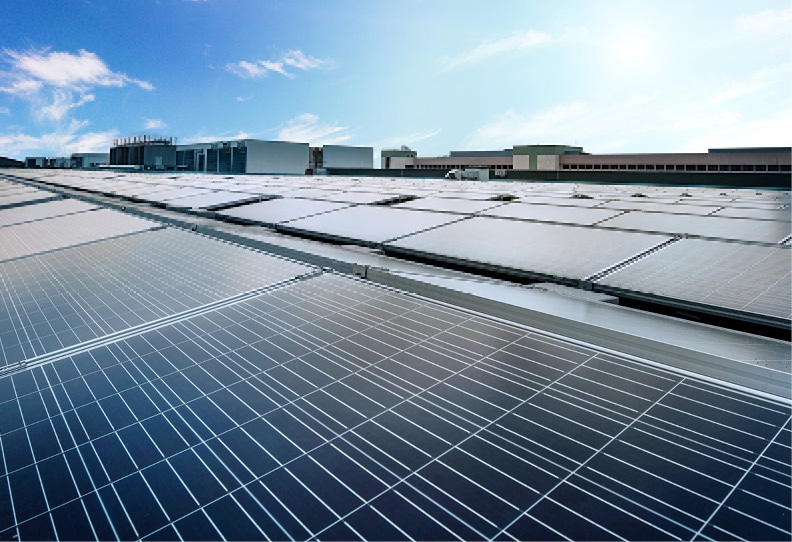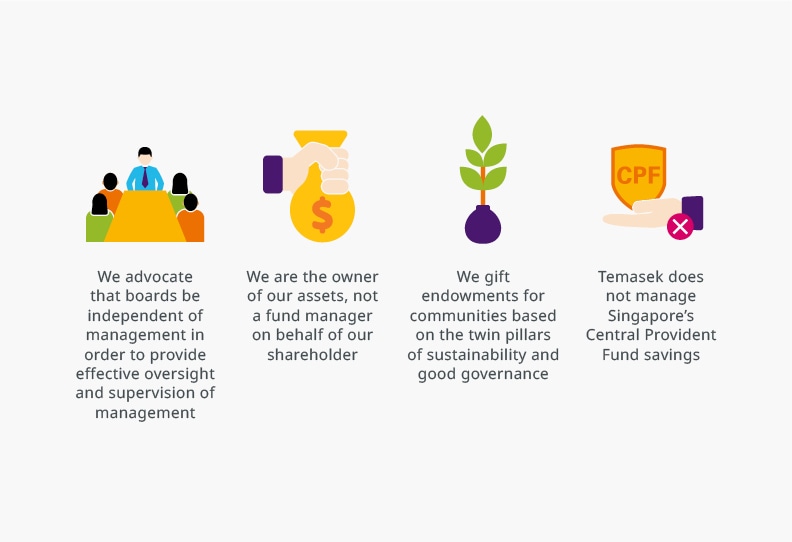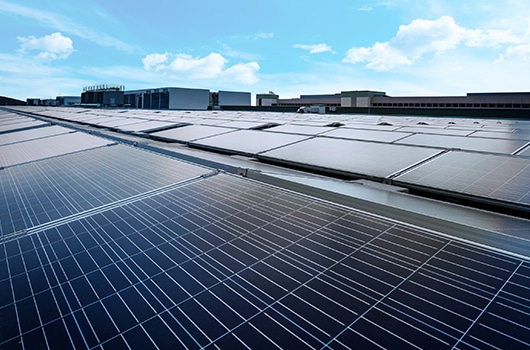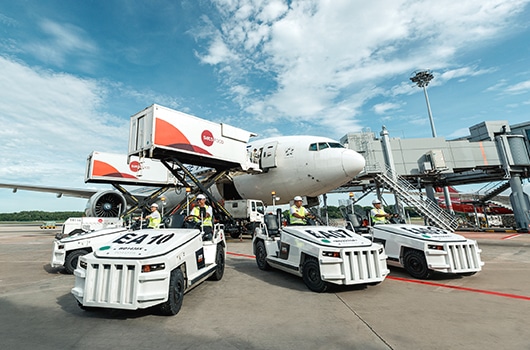Building a Sustainable Future
We are heading towards a 4°C world. We must act now, together, to secure a more viable future for all.
Data and science point to the urgency of reversing the harm done to our planet. We have barely a decade left to achieve the 2030 United Nations Sustainable Development Goals (SDGs) while we race to urgently reduce and remove carbon emissions to avoid breaching the planet's tipping point of +1.5 degrees Celsius.
As an investor, we have a critical role to play in the successful transition to a net zero carbon economy by 2050. In September 2020, Temasek became a supporter of the recommendations of the Task Force on Climate-related Financial Disclosures. We are also encouraging our portfolio companies to identify and share consistent, comparable and forward looking information on risks and opportunities they face as a result of climate change. This information is essential for us, as we seek to support sustainable businesses with the aim of building an economy that is resilient to climate-related uncertainties.
Through collective efforts with like-minded partners, we catalyse ideas to achieve a better and more resilient world. We held the 6th edition of Ecosperity since 2014 — to twin ecology and prosperity as a sustainable pathway for growth. The ultimate goal is to achieve an abc World of active and productive economies, beautiful and inclusive societies, and a clean, cool Earth.
At Temasek, sustainability is at the core of everything we do. We strive to become more sustainable in the way we operate: embedding sustainability in our investment approach and encouraging our portfolio companies to embark on their own sustainability journeys.
Our Sustainability Goals

Our belief in protecting the environment is underscored by our commitment to better managing the resources that we use in our operations.
Operating Sustainably
We achieved carbon neutrality for our company last year. By 2030, we aim to reduce net emissions attributable to our portfolio to seven million tonnes of CO2 equivalent, which represents half the estimated carbon emissions in 2010 and approximately a quarter of current emissions. This will be a decade long journey, working with our portfolio companies on their carbon reduction plans.
We started measuring our environmental footprint and have established a comparison of these key metrics over the past three years. We have developed ongoing plans to further reduce our emissions and resource use relating to our operations and have purchased carbon credits that will go towards supporting projects to offset the impact of our unavoidable emissions. While we are on a positive trajectory, there is more we can, and need to do.
(for year ended 31 March)
Three-year Environmental Footprint

- Emissions from electricity use (’000 tonnes CO2e)
- Emissions from corporate events and other sources (’000 tonnes CO2e)
- Emissions from business travel (’000 tonnes CO2e)
- Water use (’000 m3)
- Paper use (million pieces)
- Carbon intensity (tonnes CO2e per employee)
The carbon credits that we purchased to offset emissions resulting from our operations over this financial year, supported two forest restoration and conservation projects in Indonesia and Kenya. The project in Indonesia aims to prevent deforestation, peatland drainage and fires while the project in Kenya aims to protect and restore biodiversity and boost local employment.
Our staff have also championed several initiatives such as mass tree planting, to contribute to a more sustainable future.
Embedding Sustainability in our Investment Approach
We incorporate sustainability-related assessments when evaluating our investments. Our teams employ a broad-based research approach to assess company-level Environmental, Social and Governance (ESG) information, as well as relevant industry, thematic and macro sustainability considerations.
Even as we engage our existing portfolio companies on their carbon reduction plans, we actively seek out new investments which have track records of better carbon intensity and efficiency.
We will also seek out companies with business models that achieve carbon avoidance such as renewable energy and plant-based proteins, or carbon negative businesses and solutions that combat climate change, such as nature-based solutions.
We are exploring other opportunities to support sustainable solutions and climate actions, such as investing in carbon capture, sequestration and utilisation solutions, and developing a hydrogen economy.
Advocating Sustainability across our Network
Companies which manage ESG factors effectively, and recognise their importance, are more likely to create sustainable value over the long term. As an owner, we are committed to encouraging the companies in which we invest to embrace sustainable ways of doing business.
We have assessed the carbon footprint of listed companies in our portfolio and estimated the emissions for our private holdings. Key metrics, such as carbon intensity and carbon efficiency, will allow us to gain deeper insights into the carbon exposure of our portfolio and set the stage for targeted portfolio engagement activities.
We aim to collaborate with our portfolio companies to halve the net carbon emissions of our portfolio by 2030, and work towards achieving net zero carbon emissions by 2050. To help progress this goal, we will support our portfolio companies on their carbon measurement and reduction initiatives. Over the past year, we invited our Singapore-based portfolio companies to climate awareness sessions and shared with them knowledge and tools for carbon measurement and reporting according to international standards.
Catalysing Ideas
Over the past year, we supported projects that improved the efficiency of resource management in Singapore's public housing estates and explored the potential of tapping on nature to mitigate climate change.
We worked with SP Group and the Ministry of Environment and Water Resources in Singapore on a pilot project to transform Tampines, a residential estate in the eastern part of Singapore, into an "Eco Town". Initiatives for sustainable living such as in energy, water, and waste management were introduced in Tampines. We also supported an initiative to install "Eco Boards" in several public housing blocks. These digital displays use data to provide real time updates of the blocks' aggregated electricity and water usage. Residents can also track their carbon footprint and pick up tips to lower their consumption. This initiative will enable the town council to develop more efficient resource management strategies.
We funded a study to understand how blue carbon, which is the carbon stored in coastal and marine ecosystems, such as mangroves and seagrass, can mitigate climate change in Southeast Asia. Findings were shared with groups in both the public and private sectors.
Engaging with our Partners
Our annual Ecosperity conference was first held in 2014. It brings together key decision makers — business leaders, policymakers, investors and civil society — to share insights and best practices on sustainable development. This year, the conference has been postponed to 2021 due to the COVID-19 pandemic, although we stepped up our regular engagements with our portfolio companies and the public through our Ecosperity Conversations series with more virtual sharing sessions. Highlights for the year included sessions on the environmental impact of our food in Singapore, energy transition pathways in Southeast Asia, and the ocean's importance to climate change.
We actively participate in investor and business networks that share our common vision of a future that provides equal opportunity and prosperity for all.
As a member of the Green Finance Working Group under the Monetary Authority of Singapore's Financial Centre Advisory Panel, we are actively involved in shaping recommendations to establish Singapore as a green finance node. We are also working with our portfolio companies to raise awareness of sustainable finance issues.
We are a member of the World Economic Forum (WEF), the Focusing Capital on the Long Term Initiative (FCLT Global) and the Sustainability Accounting Standards Board (SASB). We take part in dialogues which aim to promote responsible investing held by these organisations and others.
Together with Temasek Trust, we are represented on the United Nations Development Programme's Steering Group of SDG Impact, an initiative to develop impact measurement standards and promote global investments that achieve the SDGs. We also engage with like-minded partners who share our ambition of promoting investing for sustainability and impact, through forums such as the Global Impact Investing Network.



